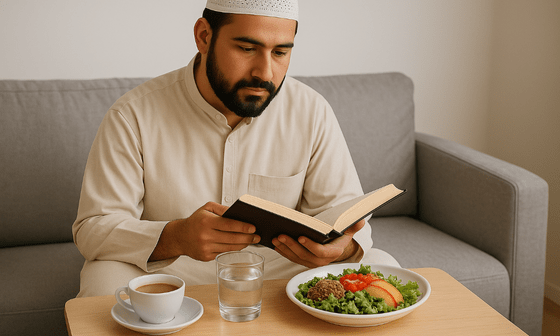As the blessed month of Ramadan comes to an end, the transition back into regular life can sometimes feel overwhelming. For a month, people fasted from dawn until sunset, adjusted their eating patterns, and dedicated themselves to spiritual growth.
However, once the fast is broken and daily routines return, it’s important to focus on regaining balance – physically, mentally, and spiritually.
We explore strategies to help you ease into the post-Ramadan period and continue living in harmony with the lessons learned during the month of fasting.
Understanding the Physical and Mental Impact of Ramadan
Ramadan is a time of discipline and reflection, but it can also have a significant impact on the body and mind. Physically, fasting affects everything from eating and drinking habits to sleep patterns. After a month of eating during specific hours and adjusting to new routines, the body might feel fatigued, dehydrated, or a little sluggish.
Mentally, the intense focus on spirituality and reflection may leave some feeling disconnected from everyday life as they adjust back to regular routines. It’s essential to recognize this transition and approach it gently to avoid overwhelming the body and mind.
Strategies for Regaining Balance

The key to a smooth transition into the post-Ramadan period is gradual adjustment.
Gradual Transition: Rather than jumping back into overeating or returning to unhealthy habits, it’s important to ease back into regular eating. Reintroduce meals slowly, allowing your digestive system to adjust. To start, we suggest breaking the fast with lighter meals such as fruits, salads, or soups.
Hydration: After a month of restricted water intake, hydration becomes especially important. Aim to drink plenty of water throughout the day, as dehydration can lead to fatigue, headaches, and a lack of energy.
Mindful Eating: Post-Ramadan is an excellent time to practice mindful eating. Avoid the temptation to overeat after a period of fasting. Focus on balanced, nutritious meals, listening to your body’s hunger cues, and savoring each bite. Eating slowly can help you rediscover the pleasure of food without overindulgence.
Physical Activity: During Ramadan, physical activity might have taken a backseat due to fasting and exhaustion. To regain balance, incorporate light exercises into your routine. Activities like walking, stretching, or yoga are great ways to re-energize your body without overstraining it.
Sleep Patterns: Many individuals experience disrupted sleep during Ramadan due to late-night prayers and early morning meals. Re-establishing a steady sleep schedule is vital for physical and mental recovery. Prioritize good sleep hygiene by setting regular bedtimes and allowing the body to get sufficient rest.
Mental Health and Spiritual Reflection
The end of Ramadan doesn’t mean the end of spiritual growth. Although fasting is over, the mental and spiritual practices developed during the month can still be part of your daily life. Continue moments of quiet reflection, meditation, or prayer.
Engaging in acts of kindness, charity, and volunteering can also extend the spirit of Ramadan into everyday life. Reflect on the lessons learned during Ramadan. Practice gratitude, patience, and discipline and find ways to integrate them into your routine.
Building Lasting Habits Post-Ramadan
As you adjust to life after Ramadan, consider the positive habits you developed during the month. Maintaining a focus on self-discipline, mindfulness, and gratitude can lead to lasting changes.
You may find that the habits formed during Ramadan can be continued as part of your lifestyle, even when fasting is not in place. Whether it’s daily prayer, charity, or intentional eating—, the key is to strike a balance between enjoying life’s comforts and maintaining the sense of spiritual and physical well-being that Ramadan encourages.
A Holistic Approach to Balance
The post-Ramadan period is a time to recalibrate and regain balance across all aspects of life. Through mindful eating, hydration, gentle physical activity, and continued spiritual reflection, individuals can smoothly transition into their everyday routines while keeping the essence of Ramadan alive in their hearts.
By approaching the end of fasting with patience and care, we can ensure that the benefits of Ramadan continue to guide us long after the month is over. May this period be one of continued growth, balance, and harmony.
If you’re looking to get back on track after Ramadan and get healthy, delicious meals delivered to your door, browse Kcal Meal Plans.







